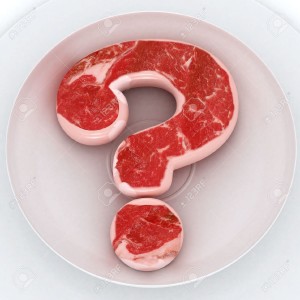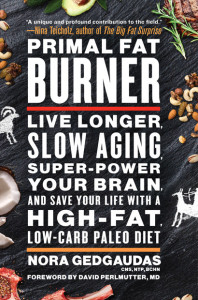
So…you love a good juicy steak? Fancy a fabulous sauteed fish fillet? Love those incredible edible eggs? Unless you’re an avowed vegetarian or vegan, who doesn’t? But…how much protein is “too much”? Is there such a thing?
This can be a complicated question to answer. Some diet pundits feel that meat is too great a source of saturated fat. Anyone who has read my book, Primal Body-Primal Mind knows what the overwhelming evidence from objective (i.e., non-corporate funded) science has to say about that misguided (to put it mildly) concern. Some think that vegetable sources of protein are somehow superior–an argument more than easily put to rest once a little basic human physiology and biochemistry are taken into account. Others assert that protein is somehow “hard on the kidneys”. –Any time spent reviewing the literature rapidly dispels that myth. If you already have kidney disease then protein restriction becomes (perhaps) more necessary….though the problem there often isn’t so much protein as it is glycated protein causing the problem (a whole different topic of discussion). From a “Paleo perspective” it’s certainly arguable that our more stone age ancestors readily consumed as much woolly mammoth at a time as their bellies would hold (or as hunting allowed). Heck–Our Primal ancestors didn’t worry about it, so why should we?
Well…
Welcome to the modern world.
Let’s just say a few things have changed–not the least of which being our better developed understanding of how mother nature “thinks” and what her intentions are…and why this may not always be compatible with our own self interests–something I go on about at some length in Primal Body-Primal Mind. But let’s start with something more obvious:
First, consider the modern day food supply:
We’re still walking around with the identical genetic profile of an Ice Age human…but nowadays we have as much easy access to food as we could ever possibly want–and more. We don’t even have to work that hard to get it, much less share it with anyone else if we don’t want to—There’s plenty to go around (at least in industrialized society). What’s one of the laws of the Primal jungle? –Feast or famine. Let’s face it, in the wild food is anything but easy to come by. In a tribal setting, also, whatever is hunted or gathered must also be shared and divided among members of the group. Sometimes there would have been enough food to go around…sometimes not. It’s unlikely our predecessors were able to gorge themselves on an 8-10 oz steak at every meal, though they would likely have done so, if given the chance. It still leaves the open question of whether they should have or not (we’ll get to that).
We still possess that feast or famine instinct…only today we have access to an unprecedented and unnatural abundance of food. There is an inherent–almost instinctual tendency to want to over eat for many…particularly if we eat when we’re really hungry (or when blood sugar is low…if you’re still dependent on that sort of thing). Many people don’t feel like they’ve been fed enough unless their plate is filled and heaping with generous portions of all the goodies they love. Buffets feel like a rip-off unless you get to go back through a second-time around and pile more on. Most people associate satiety with fullness…and far too many people are so out of touch with their own bodies that they don’t know they’re full until it becomes uncomfortable or even hurts.
In Primal Body-Primal Mind I strongly advocate and make the case for the importance of quality (read: q-u-a-l-i-t-y), complete, animal source protein. –No big surprise, right? Most writers advocating evolutionarily based dietary approaches (so-called “Paleolithic diets”) recognize the necessary role animal protein plays in our human physiological requirements. Few recommend much restriction, however…though one or two authors (who shall remain nameless) strongly assert the need for “lean” meat sources, eschewing natural fat in an effort to uphold the edicts of the now defunct, wholly inaccurate and overwhelmingly outdated lipid hypothesis.
So why would I recommend limiting protein intake at all…much less to the RDA of 44-56 grams…amounting to little more than about 6 ounces of natural protein per day??? This wouldn’t look much larger on a dinner plate than a deck of playing cards…only you’d be dividing that into 2 or 3 meals. Say WHAT??
*GASP*!!
Let’s just say I may have upset the applecart with a few die-hard carnivores…many of whom take on a “more is better” attitude toward their meat at mealtime. I can certainly sympathize. There was a time when I could have eaten a lot of them under the table and gone back for seconds when it came to a big juicy rare steak. I still love juicy rare steaks…I just limit the amount I consume at a meal nowadays.
Why on earth is that, you ask?
Am I trying to be more environmentally sensitive?
Am I trying to seem less insensitive to those suffering across the world from hunger?
Am I trying to lose weight?
Am I trying to avoid excess ammonia burden?
Am I trying to “go easy” on my digestive processes?
Am I trying to save money in these tough economic times?
Not necessarily. –Though a positive case could be made for any of this reasoning. The primary reason doesn’t have to do with any of the above…though I will say I don’t mind that a lot of these things are nice side-line benefits that come along with my primary incentive. What opened my eyes to the virtues of limited protein consumption wasn’t consideration from a Paleolithic, political, environmental or economic perspective but rather a more recent scientific one.
Turns out that 75 years of human longevity research and recent findings can help to uniquely wed our most primal nutritional requirements with a loophole that can help us all beat mother nature at her own game and stay healthier and younger much longer.
Research in just the last few years revealed a metabolic pathway that wasn’t known about before. This discovery revealed a new perspective on dietary protein that, together with insulin–can powerfully influence reproduction, aging, as well as susceptibility to degenerative illness and even cancer. Cynthia Kenyon’s important work back in the mid-1990’s revealed conclusively that the minimization of insulin is the single most important factor toward the enhancement of longevity and health. No small finding–even though it was hardly headline news (I could be persuaded by a conspiracy theory or two as to why it wasn’t at the time, but I digress). Her work pretty clearly showed the primary reason that caloric restriction–the single most effective of all anti-aging approaches–actually worked. –But it turns out there’s a secondary reason that caloric restriction seemed to confer a marked improvement in health and longevity, and resistance to degenerative processes and cancer. It has to do with something scientists found called mTOR–which stands for mammalian Target Of Rapamycin. I talk about this in my book at considerable length and won’t overly go into it here. Suffice it to say that this newly discovered metabolic pathway, “mTOR”, apparently serves as a sort of metabolic “protein sensor”. It belongs to something called the “P13K” pathway that is activated by insulin, nutrients and growth factors. It turns out that keeping mTOR down-regulated–by limiting protein intake to what is simply necessary for maintenance–is actually part of the key to maximizing our internal repair and regeneration, immune function–enhancing longevity, anti-aging and minimizing the risk of cancer. Coupled with maintaining low insulin levels, keeping the mTOR pathway largely down-regulated helps keep deterioration and disease at bay and helps keep us young. Ironically, dietary fat has no negative influence here.
Because mTOR is intimately involved with growth and reproduction, however, there may be instances–such as while seeking successful conception, pregnancy, extreme work loads, high level athletic training and critical growth periods from infancy through adolescence where the practice of limiting protein and mTOR might be less desirable. During time periods such as this the stimulation of cellular proliferation becomes more necessary. Apart from times like this, however, higher than needed amounts of protein can take away from your own maintenance and repair, lessen immunity, and make you far more susceptible to cancer.
Protein is not our enemy…but it is certainly true that too much protein is also arguably not necessarily our friend.I choose (with sound reason) to define “too much” as anything overly provoking of mTOR. Also, keep in mind that protein in excess of what is actually needed for repair and maintenance simply gets converted to glucose and is stored the same way.
I’ve also realized that 1) it’s not at all necessary to eat that big a portion of protein to truly have “enough” 2) it’s entirely possible to be fully satisfied with less, using sufficient accompanying dietary fat (this is KEY) 3) Past a certain amount in a meal protein ceases to be purely beneficial and really can place considerable demand on energy and digestive, etc. systems that can also lead to undesirable consequences (i.e., impaired digestion, excess ammonia burden, and potential weight gain). Former “carbovores” who try to switch to eating “high protein diets” may be just that much more efficient, too, at turning that excess protein into sugar and storing it the same way 4) it’s unnecessarily expensive to eat this much…and by restricting protein consumption in this way one can literally save thousands of dollars on grocery bills. –Not even counting the money you save avoiding processed junk, all the sugary and starchy carbs, juices, sodas and alcohol. Protein is often the most expensive thing we buy at the grocery store (not counting “specialty gourmet items”). Eating even THE best possible quality food becomes literally downright cheap. I kid you not. This amounts to literally the least expensive way to eat optimally well anywhere. Plus, you’re saving a fortune on medical bills in the long run, too—all the while you’re experiencing a rather astonishing enhancement of your energy, immune function and well-being. It’s a win-win–as long as you’ve also ditched the sugar and starch (and are eating enough natural fat).
Of course, you might not get to indulge in gorging yourself on that 10 oz side of beef–but truth be told, I doubt you’d much miss it.
Protein takes more energy than anything else to digest. By moderating your protein intake you lessen that burden and have more energy for a whole lot of other things. If you still want that 10 oz steak with dinner, go ahead. –But your appetite could be every bit as satisfied with less, you’d have better quality digestion, more energy and probably live longer and healthier than you otherwise would if you’d give the ideas in Primal Body Primal Mind a try.
Besides, it may not be nice to fool mother nature, but it sure can be fun and a whole lot healthier beating her at her own game.
Watch this video of me talking about Metabolic Function & Excess Protein Consumption at Paleo f(x):



Thanks for clearing this up a bit. I enjoy your podcasts but was unclear on your reasons to moderate protein. I thought it strange that you go with the RDA amount when all of your other recommendations are against the RDA. It’s a confusing issue after looking at the zero carb diets and the paleo diets. I haven’t had the results that I’ve wanted with the free for all no measure no count no restriction diets. I will curtail my protein to a point but to a higher degree for my workouts and weight lifting.
Thanks for the information. One other question. I’ve looked into the neurofeedback but can’t afford it. Are there low cost versions? Meditation etc?
Hi, saw your link to this article on MDA.
You might want to fix your reference to PI3K. Identifying it as P13K is apparently a common mistake, but it’s phosphatidylinositol 3-kinase.
Nick
Dear Wes–
Neurofeedback is a fairly unique approach, though there are other forms of neurotechnology that can have positive brain impact: there’s AVS (Audio-Visual Stimulation) you can check out by going to http://www.mindalive.com. If you talk to Dave Siever, tell him Nora sent you. 🙂 I also like CES (Cranio-Elecro Stimulation)–go to http://www.alpha-stim.com, HRV (Heart rate Variability Training)–check out http://www.heartmath.com, The Listening Program by ABT Technologies, Transcranial Magnetic Stimulation (Enermed.com)….and you can also try self-help approaches like The Sedona Method which I find to be a singularly powerful self-help technique (though not really at all related to neurotechnology).
Neurofeedback is largely my primary mode of choice because it has such specificity of effect, enhances overall brain function, improves state regulation and stress management naturally and long term in a way that doesn’t require ongoing sessions (past the original course of training). It’s also non-invasive, incredibly powerful and very self-empowering.
I hope this helps! Good luck, Wes…and thanks for writing.
Hi Nora,
This really puts things into a good perspective for me. As an Eastern Orthodox Christian, we fast from animal products twice a week and seasonally, amounting to a little less than 1/2 of the year. I have always always wondered about this wisdom, especially since following WAP nutritional guidelines, but what you write here may have shed some light on it. It also seems to be important form the alkaline/acid perspective. Do you have any thoughts on that?
Thanks!
maria.
So you seem to be implying we should eat the *fattiest* cuts of meat, not the leanest. (Grass-fed, of course!) That way, for the same-sized chunk of dead animal on our plate, there will be a relatively small amount of protein, and a relatively large amount of fat. And since the body will preferentially use the fat for energy over the protein, all the protein will be used for cellular repair, and not spike insulin… correct? And we’d need to spend less, because fattier cuts can be cheaper.
Hi Nora: I just finished reading your book and really enjoyed it. It really helped me to get more comfortable with the idea of ketosis. The protein issue is a bit confusing to me as I think the U.S. RDA is still too high for me. I am very petite, at 5′ tall, and I think I should be eating even less protein that that. I’m thinking around 30-40. For weight loss, maybe 30. I am struggling with losing some weight (baby weight from baby #2) and in my struggles to lose the last 8 lbs., I ended up gaining weight on a low carb diet that perhaps was too high in protein and maybe not low enough in carbs. Does my height and frame actually make a difference in how much protein my body needs for maintenance, in your opinion? I am also pretty active….running after kids, running on the treadmill, yoga, free weights…about 3 times per week. Thank you for your response.
In short, yes–your weight and especially lean mass really do dictate your protein needs. Obviously, your activity level also makes a difference, which should be taken somewhat into account. In a conversation I just had with Ron Rosedale, MD (of “The Rosedale Diet”) who has exhaustively researched this very subject– although he liked my use of the protein RDA (44-56 grams/day) as a baseline average for most he also intimated this might very well even be too high for some! The idea is not to overly provoke the mTOR pathway or eat protein to excess of basic restructuring and maintenance need lest excesses go into energy production (i.e., conversion to sugar and potentially body fat and glycation).
Hi Nora
It’s great to hear that we don’t need so much protein, as I always felt a bit sick on very high protein diets. But I’m a little confused. Do you count a 60 gram egg, as 60 grams of protein or 8 grams of protein content? Another example, to get 175grams (6 ounces) of protein from steak, I would need 875g (30 ounces) of steak, which I know is not what you mean. But would 3 eggs a day cover my entire protein needs? Thank you for helping me out.
I’m in the middle of your new book, Adrenal Fatigue and and am very grateful for this information.
Hi Nora – I am interested in Tamar’s question above, but it doesn’t look like it has been responded to since posting in January. Can you please advise? Also, can you advise if you recommend limiting ALL protein or just animal protein? For example, if I drink 2 glasses of bone broth per day, and have one small organic beef patty (90g), that gets me to 59g. Then between avocado, lots of greens, butter coffee, fetta cheese and a few more bits, I’m up at over 80g / day. Does this have the same negative impact on insulin, or is it just the animal protein? What about collagen powders?
Many thanks
Kate
Personally I don’t weight my protein to know how much I am consuming.
I just consume until I am satisfied. If that 300g or 1kg, I’ll eat it. One thing I make sure I have is that the meat is fatty meat.
Thats just me, but if someone is sensitive to blood sugar, they should probably try to eat more fat in proportion to protein as protein is still insulinogenic.
The primary issue concerning the consumption of protein in excess of what is required for basic maintenance and repair is not so much the sugar issue (although excess dietary protein can certainly boot a person out of fully effective ketosis), but instead the activation of the mTOR pathway. I discussed this at length in my books. The implications of this activation can lead to both undesirably premature aging and significantly increased cancer risk. It is just not a good idea.
My primary interest as a health consultant is in supplying information that can help optimize the health of those interested in optimizing their health. If you are not interested in optimizing your health, and you don’t mind increasing your risk of unnecessary and potentially risky cellular proliferation, then the choice is yours. But it is far healthier to limit protein to meeting but not exceeding roughly 0.5-0.8 grams/kg of estimated ideal body weight.
Nora Gedgaudas, CNS, NTP, BCHN
<3
Thank you! You are so generous. I appreciate the way you answer the comments and share all your knowledge.
Thank you from Chile.